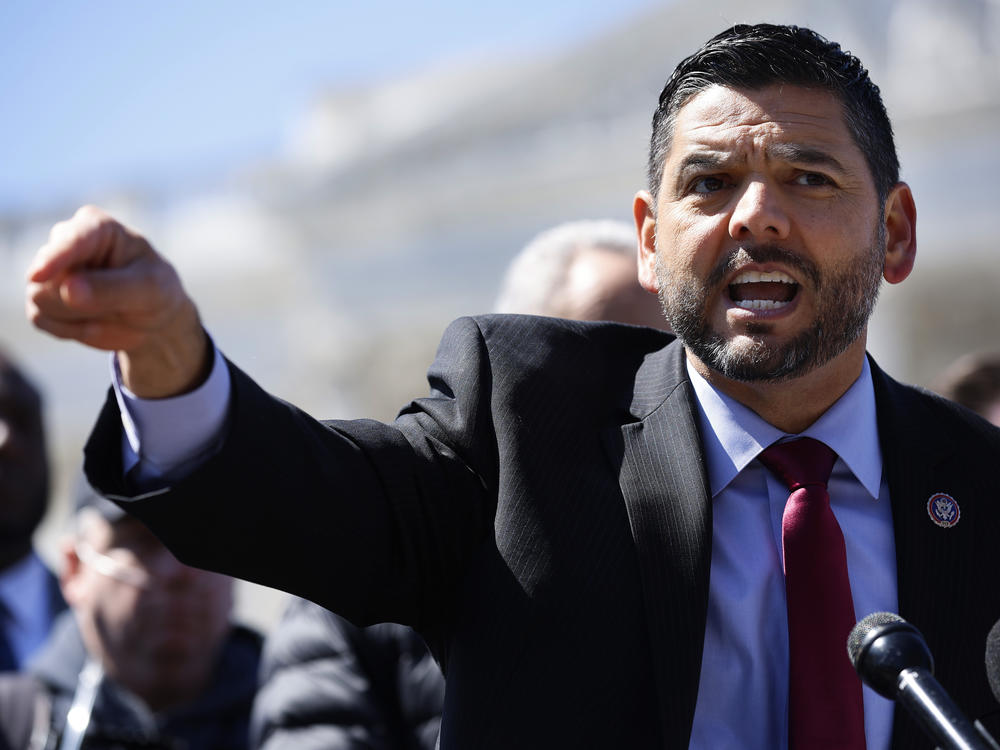Section Branding
Header Content
Children as young as 12 work legally on farms, despite years of efforts to change law
Primary Content
Updated June 12, 2023 at 1:39 PM ET
Amid discoveries of 13-year-olds cleaning saws in meatpacking plants and 10-year-olds working in the kitchen at a McDonald's, the Biden administration has vowed to crack down on child labor violations in the U.S.
But largely absent from those discussions are the estimated hundreds of thousands of children who are legally working in equally hazardous conditions on farms.
House Democrats are seeking to bring those children into the conversation, with a bill introduced Monday that would raise the minimum age for children working in farms from 12 to 14, a change sponsors say would rectify a decades-old double standard.
A different standard for children working in agriculture
Under federal labor law, children must be 14 to take on all but a tiny handful of jobs, and there are limits to the hours they can work.
But due to a carveout with origins in the Jim Crow South, children can be hired to work on farms starting at age 12, for any number of hours as long as they don't miss school.
And while children are generally prohibited from doing hazardous work in other sectors, there's an exception for agriculture. At 16, children can operate heavy machinery and perform tasks at any height while working on a farm without any protections against falling, unlike in other industries.
The Children's Act for Responsible Employment and Farm Safety would do away with the double standard, by raising the minimum ages for agricultural work to match all other occupations.
"We're not asking for anything more or above. We're asking for parity," says Democratic Congressman Raul Ruiz of California, one of the bill's sponsors.
Different standards in agriculture lead to "absurd parallels"
Margaret Wurth, senior children's rights researcher at Human Rights Watch, says current labor law creates absurd parallels, where children of the same ages doing the same work aren't receiving the same protections, simply because they're working in different sectors.
"So for example, to operate a circular meat slicer at a deli, you'd have to be 18. But to use that same kind of circular saw on a farm, you could be 16," she says.
Employers in construction must provide protections from falling for workers who are performing tasks at heights over six feet. On farms, however, children 16 and over can work at any height with nothing to protect them from falling, Wurth says.
Not this bill's first rodeo
Many versions of this bill have been introduced over the years. Ruiz is taking up the mantle from another California Democrat, Rep. Lucille Roybal-Allard, who first introduced the measure in 2005 and repeatedly reintroduced it without success.
"This is an injustice for farmworker communities," says Ruiz.
Wurth is hopeful that with the national reckoning happening around child labor in recent months, this time will be different.
"I think it's just an issue of people not realizing that we still have these harmful carveouts in law that allow this to legally be happening in our country," she says.
Opposition from farmers who see a threat to family traditions
Prior iterations of the CARE Act were met with fierce opposition from farms. At a hearing last fall, agricultural policy attorney Kristi Boswell, who grew up on farm and later served in President Trump's agriculture department, warned that traditions held families like her own would be threatened.
"My niece and nephews would not have been able to detassel corn at ages 12 and 13, despite their parents knowing they were mature enough to handle the job," Boswell said in her testimony.
"It is critical now more than ever that our policies develop our next generation of farmers and ranchers, rather than discouraging them."
Ruiz counters that his bill includes exemptions for family farms, to allow traditions — such as passing farming know-how to children on the job — to continue.
"Exceptions were made to accommodate them," he says.
Wurth says the idea behind this bill is not to keep the children and other relatives of farm owners from working and learning the family business. It's about protecting those who are the most vulnerable.
"These are Latinx children and their families who are working in the fields because they're living in extreme poverty," she says.
Not a comprehensive solution
Even if it passes, Wurth says the CARE Act might not end child labor in agriculture. Many families depend on the income of their children. Absent a living wage and accessible child care, cutting off that source of income could hurt their family's livelihood.
Still, Wurth says the bill would set a foundation for tackling the issue.
Today, if a labor inspector goes to a farm and finds a 12-year-old working a 14-hour shift in a tobacco field, there would be no violation to report, she notes.
"That's why this labor law desperately needs to be updated," she say. "So at least kids have that basic foundation and protection of a sensible legal framework."
Copyright 2023 NPR. To see more, visit https://www.npr.org.


